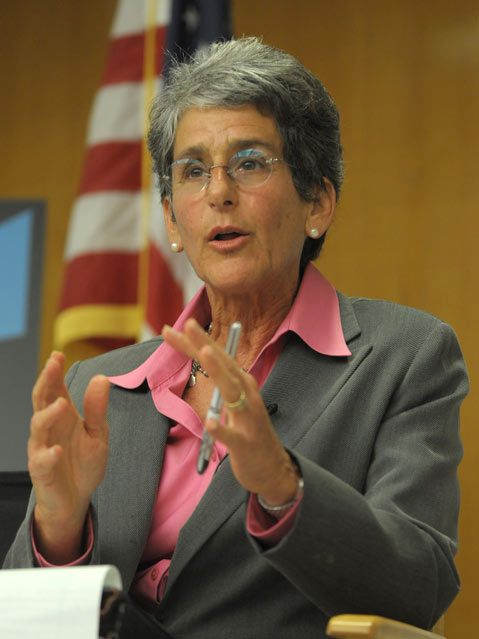Jackson Demands Answers About Inmate Sterilization
Questions How Federal Authorities Were Unaware
California State Senator Hannah-Beth Jackson, co-chair of the Legislative Women’s Caucus, signed a letter demanding to know how the federal receiver overseeing California’s prison system didn’t know that female inmates were being sterilized by prison doctors. One hundred and forty-eight women have been sterilized since 2006 without following the state’s strict legal requirements.
“Pressuring a vulnerable population – including at least one documented instance of a patient under sedation – to undergo these extreme procedures erodes the ban on eugenics,” stated the letter, which was signed by Jackson and 19 others. “In our view, such a practice violates Constitutional protections against cruel and unusual punishment; protections that you were appointed to enforce.”
Forced sterilizations of California prisoners and mental patients were banned in the 1970s. In 1994, the legislature passed a law requiring that any prison sterilizations be cleared by a panel of statewide medical authorities, on a case-by-case basis.

Last week, the Center for Investigative Reporting released an exposé revealing that 148 prison sterilizations – tubal ligations – had occurred since 2006 and perhaps another 100 were had been performed since the late 1990s. According to the report, many of the female inmates contend they were pressured and coerced into these operations by prison medical officials. Also according to the report, prison medical officials targeted inmates they deemed likely to return to prison and those who’d had multiple C-section births already.
Since 1997, the state has paid nearly $150,000 to have these procedures performed on women inmates. Dr. James Heinrich, who performed many of these procedures in Valley State Prison on Chowchilla, has been quoted as stating that this was not a large sum “compared to what you save in welfare paying for these unwanted children.” The letter Jackson signed was directed to the federal government because since 2006 California’s prison system has been under a federal receivership – state prison populations so far exceeded California’s prison capacity it constituted cruel and unusual punishment in the eyes of three federal judges.
Under that federal pressure, California Governor Jerry Brown successfully pushed a measure (Assembly Bill 109) that’s shifted about 10,000 of the state’s least violent prisoners back to their counties of origin for oversight and rehabilitation. In addition to the overcrowding, federal judges have also been adamant that quality of care for the mentally ill within California’s prisons poses a serious Constitutional problem. In recent months, Governor Brown has unsuccessfully argued that California prisons have been sufficiently reformed that the receivership can be lifted.
In that context, the letter Jackson co-signed to Federal Receiver Clark Kelso seems like a double-edged sword. On one hand, it demands an accounting of how federal overseers were asleep at the switch when it comes to the tubal ligations. Whether they were coerced or not, there’s no record that the state law requiring strict oversight of such operations was complied with at all. On the other hand, the Jackson letter highlights additional shortcomings on the part of state prison officials. “Over the last three years,” the letter reads, “the Senate has asked repeatedly for information regarding these procedures and the policies under which they occurred. We have yet to receive a full explanation from your office on these procedures, despite a claim by investigative reporters that records show your office has been aware that sterilizations were happening.”
The issue of forced sterilization is especially raw in California, which led the nation in such operations with more than 20,000 between 1909 and 1964. California was such a pioneer of eugenic social policy – designed to weed out “defectives” and other undesirables – that Nazi Germany looked to California eugenicists for advice in the 1930s.



